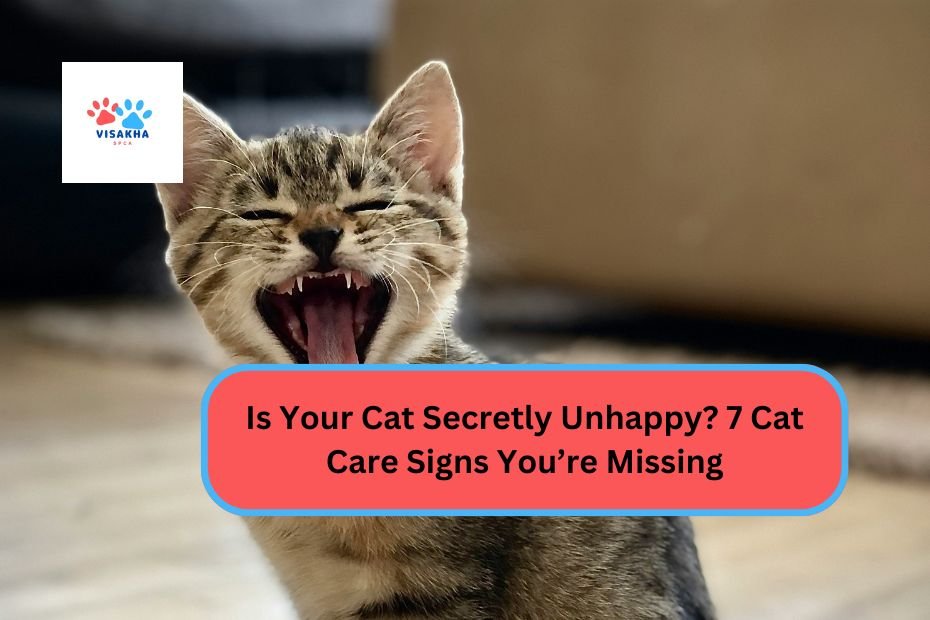Cats are often seen as independent creatures, which can sometimes lead us to underestimate their emotional needs. While they may not express their feelings as overtly as dogs, cats can experience unhappiness or stress, which can significantly affect their health and behavior. As a responsible cat owner, it’s crucial to be aware of the signs that your feline friend may not be as content as they appear. Here are seven cat care signs you might be missing that could indicate your cat is secretly unhappy.
1. Changes in Appetite
Why It Matters
Sudden changes in your cat’s eating habits can be a clear indicator of emotional distress or health issues.
What to Look For
- Decreased Appetite: If your cat is eating less or showing disinterest in their favorite foods, it could be a sign of stress, boredom, or a health problem.
- Increased Appetite: Conversely, overeating can also signal issues, such as boredom or anxiety.
Action Steps
Monitor your cat’s eating habits and consult a veterinarian if you notice significant changes. Keeping a food diary can help you track their appetite.
2. Excessive Grooming or Lack of Grooming
Why It Matters
Grooming is a normal behavior for cats, but excessive grooming or neglecting grooming can indicate underlying issues.
What to Look For
- Excessive Grooming: If your cat is over-grooming, leading to bald patches or skin irritations, it may be a sign of anxiety or stress.
- Lack of Grooming: On the other hand, a decrease in grooming habits may suggest that your cat is feeling lethargic, depressed, or unwell.
Action Steps
Pay attention to your cat’s grooming habits. If you notice either excessive or insufficient grooming, it’s time to visit the vet for advice and possible solutions.
3. Changes in Litter Box Habits
Why It Matters
A cat’s litter box behavior can provide valuable insights into their emotional and physical health.
What to Look For
- Avoiding the Litter Box: If your cat suddenly refuses to use the litter box, it could be a sign of stress or medical issues, such as a urinary tract infection.
- Frequent Elimination: On the other hand, frequent urination or defecation outside the box may indicate anxiety or territorial issues.
Action Steps
Monitor your cat’s litter box usage and consult your veterinarian if you notice any concerning changes. Keeping the litter box clean and in a quiet location can also help reduce stress.
4. Aggression or Irritability
Why It Matters
A typically friendly cat may become aggressive or irritable due to stress, fear, or discomfort.
What to Look For
- Hissing or Swatting: If your cat suddenly starts hissing, swatting, or acting aggressively towards you or other pets, it could be a sign of unhappiness.
- Withdrawal: Conversely, a previously sociable cat may become withdrawn and avoid interaction.
Action Steps
Evaluate any recent changes in your cat’s environment, such as new pets, moving, or changes in routine. Provide a safe space for your cat to retreat when they feel overwhelmed.
5. Destructive Behavior
Why It Matters
Cats may resort to destructive behaviors when they are bored, anxious, or unhappy.
What to Look For
- Scratching Furniture: While scratching is a natural behavior, excessive scratching of furniture or walls may indicate frustration or boredom.
- Knocking Things Over: If your cat is frequently knocking things off tables or engaging in other disruptive activities, it may be seeking attention or expressing dissatisfaction.
Action Steps
Provide ample toys, scratching posts, and interactive activities to keep your cat engaged. If destructive behaviors persist, consult a veterinarian or a pet behaviorist for tailored advice.
6. Change in Vocalization
Why It Matters
Cats communicate through vocalizations, and changes in their usual patterns can indicate emotional distress.
What to Look For
- Increased Meowing or Yowling: If your cat is suddenly more vocal than usual, it could be a cry for help or a sign of anxiety.
- Silence: Conversely, a typically chatty cat that becomes quiet may be feeling unwell or depressed.
Action Steps
Observe your cat’s vocalization patterns and consider any changes in their environment that may have triggered the change. If concerns persist, discuss them with your veterinarian.
7. Excessive Hiding
Why It Matters
While cats enjoy cozy hiding spots, excessive hiding can be a sign of stress, fear, or illness.
What to Look For
- Avoiding Interaction: If your cat spends most of their time hiding and avoids social interaction, it may indicate they’re feeling insecure or unwell.
- Reduced Exploration: A happy cat usually explores their environment. If your cat seems hesitant to leave their safe space, it could be a red flag.
Action Steps
Encourage exploration by creating a safe, stimulating environment. Provide enticing toys or treats to draw your cat out of hiding, and ensure they have access to a safe space if they need it.
Conclusion
Being a responsible cat owner involves recognizing the signs of unhappiness in your feline friend. By paying attention to changes in appetite, grooming habits, litter box behavior, aggression, destructive actions, vocalizations, and hiding tendencies, you can identify when your cat may be feeling unwell or unhappy.
If you notice any of these signs, don’t hesitate to consult with your veterinarian to rule out medical issues and explore ways to enhance your cat’s well-being. Remember, a happy cat leads to a happy home, and your attention to their emotional needs can make all the difference!

